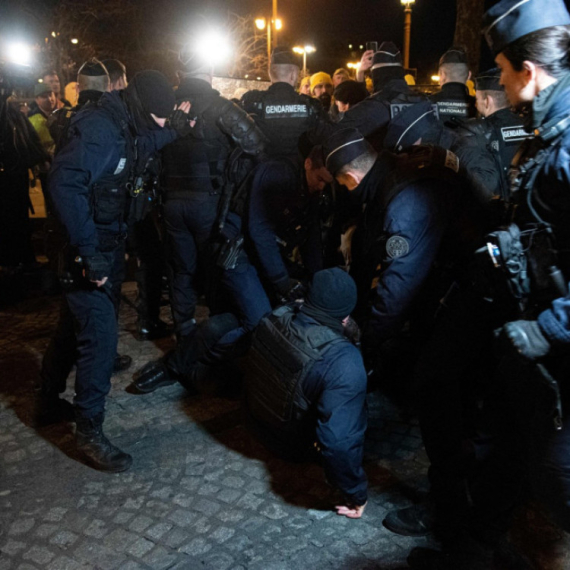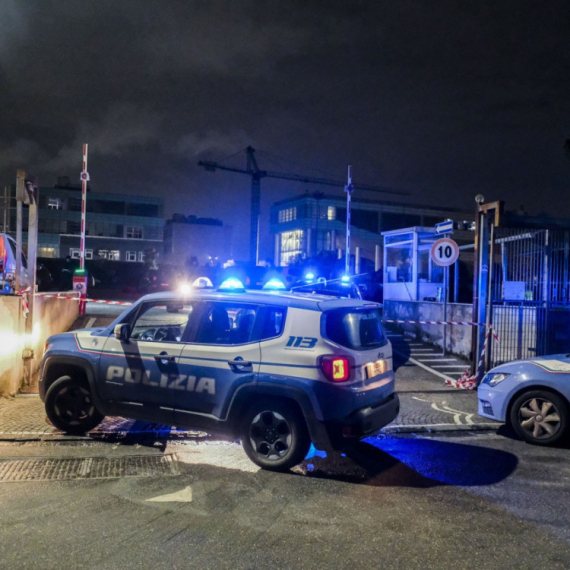Minister: Serbia's institutions to remain in Kosovo
Minister for Kosovo Goran Bogdanović said on Wednesday that Serbia will continue to perform its functions in the north of Kosovo and Metohija.
Wednesday, 24.08.2011.
16:02

Minister for Kosovo Goran Bogdanovic said on Wednesday that Serbia will continue to perform its functions in the north of Kosovo and Metohija. The country "will not give up on its institutions in that territory", the minister was quoted as saying. Minister: Serbia's institutions to remain in Kosovo Bogdanovic said that "messages and demands" for Serbia to abolish the so-called "parallel institutions" serving Serbs in Kosovo and Metohija were "absolutely and utterly unacceptable", and that the state would continue to perform its function and role in Kosovo. He went on to say that "at this point it's a thankless task to speak about whether Serbia will continue with the same decision even if insisting on parallel institutions blocked Serbia's European path". "We are completely dedicated to fulfill all EU criteria, but this issue concerns our statehood, our Constitution and our laws," Bogdanovic was quoted as saying. He further noted that it was "completely wrong" to refer to the Serbian institutions as parallel, since they were formed in democratic elections by the people's free will, and added that the illegitimate institutions of Pristina could be referred to as parallel. "It is precisely thanks to their own institutions that the Serb population in Kosovo and Metohija remained there and survived. That fact shows in the best way possible that our institutions in Kosovo are a real and essential necessity of the Serb people and their survival," he concluded. Serbs form a majority north of the Ibar River and reject the authority of the Kosovo Albanian government in Pristina, as well as the ethnic Albanians' unilateral declaration of independence made in early 2008. Serbia considers the proclamation an illegal act of secession. Goran Bogdanovic (Beta, file) "Parallel difficult to define" State Secretary for Kosovo-Metohija Oliver Ivanovic also addressed the issue on Wednesday, commenting on German Chancellor Angela Merkel's statements regarding Kosovo, to say that while Europe was the goal Serbia was striving towards, the country cannot go against its Constitution and national interests. "Europe is the notion we are striving to, but Europe cannot set requests which are impossible for Serbia to meet," Ivanovic told Tanjug and underscored that Belgrade cannot be required to stop fighting for the rights of the remaining Serb population in the southern Serbian province and for the return of displaced and expelled people. Commenting on Merkel's message that Serbia should make it possible for EULEX to operate in the entire territory of Kosovo and abolish parallel structures in northern Kosovo, Ivanovic said that the term "parallel structures" should be used carefully because "these are difficult to define". "The structures in northern Kosovo that some may call parallel are at the same time the only structures that Serbs have trust in, which is why insisting on their abolishment in the domains of education, healthcare, social policy, culture and information would entail separation of Serbs from everything that is Serbian, and this would inevitably lead to their displacement," he said and added that such structures "have no alternative". When it comes to enabling EULEX to operate in the entire territory of Kosovo, Ivanovic said that there were "no uncertain points as to the cooperation" but that problems arise only when the EU mission in Kosovo "lacked a clearly defined mandate and put themselves at Pristina's service". "The moment EULEX truly decides to fight organized crime and launches counter-crime actions in Pristina, there will be no more obstacles to taking control of the off-shoots - for those are only off-shoots - of organized crime in northern Kosovo," Ivanovic said.
Minister: Serbia's institutions to remain in Kosovo
Bogdanović said that "messages and demands" for Serbia to abolish the so-called "parallel institutions" serving Serbs in Kosovo and Metohija were "absolutely and utterly unacceptable", and that the state would continue to perform its function and role in Kosovo.He went on to say that "at this point it's a thankless task to speak about whether Serbia will continue with the same decision even if insisting on parallel institutions blocked Serbia's European path".
"We are completely dedicated to fulfill all EU criteria, but this issue concerns our statehood, our Constitution and our laws," Bogdanović was quoted as saying.
He further noted that it was "completely wrong" to refer to the Serbian institutions as parallel, since they were formed in democratic elections by the people's free will, and added that the illegitimate institutions of Priština could be referred to as parallel.
"It is precisely thanks to their own institutions that the Serb population in Kosovo and Metohija remained there and survived. That fact shows in the best way possible that our institutions in Kosovo are a real and essential necessity of the Serb people and their survival," he concluded.
Serbs form a majority north of the Ibar River and reject the authority of the Kosovo Albanian government in Priština, as well as the ethnic Albanians' unilateral declaration of independence made in early 2008.
Serbia considers the proclamation an illegal act of secession.
"Parallel difficult to define"
State Secretary for Kosovo-Metohija Oliver Ivanović also addressed the issue on Wednesday, commenting on German Chancellor Angela Merkel's statements regarding Kosovo, to say that while Europe was the goal Serbia was striving towards, the country cannot go against its Constitution and national interests."Europe is the notion we are striving to, but Europe cannot set requests which are impossible for Serbia to meet," Ivanović told Tanjug and underscored that Belgrade cannot be required to stop fighting for the rights of the remaining Serb population in the southern Serbian province and for the return of displaced and expelled people.
Commenting on Merkel's message that Serbia should make it possible for EULEX to operate in the entire territory of Kosovo and abolish parallel structures in northern Kosovo, Ivanović said that the term "parallel structures" should be used carefully because "these are difficult to define".
"The structures in northern Kosovo that some may call parallel are at the same time the only structures that Serbs have trust in, which is why insisting on their abolishment in the domains of education, healthcare, social policy, culture and information would entail separation of Serbs from everything that is Serbian, and this would inevitably lead to their displacement," he said and added that such structures "have no alternative".
When it comes to enabling EULEX to operate in the entire territory of Kosovo, Ivanović said that there were "no uncertain points as to the cooperation" but that problems arise only when the EU mission in Kosovo "lacked a clearly defined mandate and put themselves at Priština's service".
"The moment EULEX truly decides to fight organized crime and launches counter-crime actions in Priština, there will be no more obstacles to taking control of the off-shoots - for those are only off-shoots - of organized crime in northern Kosovo," Ivanović said.





















































Komentari 7
Pogledaj komentare